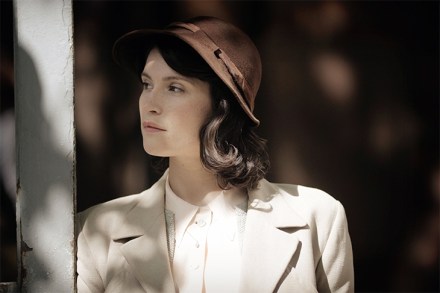Books and Arts – 4 May 2017

The good, bad and ugly in arts and exhbitions
Bashing the BBC often becomes a popular blood sport in times of political instability, and especially if the left is weak and un-able to defend itself. You only have to think back to the period when Margaret Thatcher was leading the Tories and lambasting Auntie to recognise that there is some truth in this aphorism. It’s not surprising, then, that we’re going through another phase of repeated attacks on the BBC’s impartiality, the unfair advantage provided by the licence fee, its ‘dumbing down’ to satisfy a broad audience. Those of us who rely on listening to the radio to keep us sane in a mad, mad world need to rally


Left-wing groupie Paul Mason has written a costume drama about the suppression of the Paris commune in 1871. We meet Louise Michel and her all-female gang of arsonists as they’re carted off to jail for setting fire to the Tuileries. After a harsh stint in the cells, they’re shipped out to the French colony of New Caledonia, in the eastern Pacific, where they live in an open prison. Things aren’t too bad. They mingle with the natives, enjoy the local hooch, and sing comradely songs about ‘spilling the blood impure’. Escape is on the agenda. A committee of anarchists is said to be making swift progress across the ocean in

Some opera-lovers prefer concert performances to full stagings. I don’t. It’s that whole Gesamtkunstwerk thing: opera needs to be seen as well as heard. There’ll always be circumstances in which concert performances are welcome — to rescue a neglected score, say, or if a symphony orchestra wants to stretch itself. But when a major company presents standard repertoire in concert, it feels like an admission of defeat. Opera North recently mounted a magnificent concert version of Wagner’s Ring — but for all the brave talk about a ‘radically stripped-back’ production, who seriously doubts that, if funds had allowed, it’d rather have gone the whole way? Now it’s doing Turandot in

A tragic flaw is one thing — every hero should have one — but Mayerling’s Rudolf, a syphilitic drug addict with a mother fixation and a death wish, is a very hard man to love. Kenneth MacMillan’s 1978 ballet, currently being revived at Covent Garden, tells the complex tale of the Crown Prince of Austria-Hungary and his 1889 suicide pact with his teenage mistress. The narrative unfolds in flashback with cinematic sweep to a cunning patchwork of 30 Franz Liszt compositions invisibly mended by John Lanchbery. The grandeur of the Viennese court is deftly sketched by designer Nicholas Georgiadis. Vast interiors are evoked with a swath of fabric and the

Like most documentaries, Britain’s Nuclear Bomb: The Inside Story (BBC4, Wednesday) began by boasting about all the exclusives it would be serving up. Unlike most, it was as good as its word. What followed did indeed contain much previously unseen footage and interviews with people — including ‘this country’s bomb-maker in chief’ — who’ve never before spoken about the part they played in Britain becoming a nuclear power. It also did a neat job of fitting the story to our favoured national myth: the one about old-fashioned British pluck and know-how triumphing over both the odds and the shamefully professional ways of other countries. In the 1930s, for example, the

Two 16-year-old schoolgirls from a sink estate in Bradford find fun and happiness by shacking up with a middle-aged married man — if you’ve never seen it, it sounds like the worst movie ever made. Yet Rita, Sue and Bob Too was a delight, one of the best British films of the 1980s, and this month it’s being rereleased in a new restoration by the BFI. I saw it when it first came out, in 1987, and fell head over heels in love with it. At last, here was a film about working-class life that wasn’t glum. Watching it again, 30 years on, it still feels just as fresh and
Much has been said about the endless photographic mediocrity of the digital age. The infinite glossy ads, the stream of cheap tourist snaps and sea of selfies. You’d forgive a young photographer for feeling disillusioned. In a world where 2 billion images are uploaded to the internet every day, how can you ever be original? What power is there even left in photography? Spread over the east and west wings of Somerset House, the Sony World Photo Awards (open until 7 May) answers these questions at full tilt. The pictures in this mammoth exhibition were selected from over 220,000 online entries from 183 countries – amateur and professional. As an

These days, Aubrey Powell is a genial 70-year-old who can be found most mornings having breakfast at his local Knightsbridge café. But in the late 1970s, he did something that surely no other human being has done before or since. He photographed a sheep lying on a psychiatrist’s couch on a beach in Hawaii. Its coat had been treated with Vidal Sassoon products, and it was sedated with Valium because it was scared of waves. So what on earth was he up to? The answer — as anybody who recognises Powell’s name will guess — was creating one of the 373 album covers that his company Hipgnosis designed back when

Herbert von Karajan established the Easter Festival in Salzburg 50 years ago with a production of Die Walküre that is now considered legendary. In the sense that legends are rooted in memory, and mythological in substance, that much is true. Which is not to damn it with faint praise. This revival, staged by Vera Nemirova, was an old-fashioned representation of Wagner and many Wagnerians, having endured too many modern presentations of the Master, who has suffered more than any other composer from the curse of Regietheater, would say that that is No Bad Thing. A giant ash tree, in whose hollowed-out trunk reside Hunding and Sieglinde, was the single, simple


Christopher Hampton’s 1968 play The Philanthropist examines the romantic travails of Philip, a cerebral university philologist, forced to choose between his unexciting fiancée and a predatory seductress. The play’s opening scene contains one of the most brilliant comic shocks in all drama. And the paradoxes and flashes of Hamptonian wit are an everlasting treat. ‘I’m a man of no convictions,’ says Philip. ‘At least I think I am.’ The production, brilliantly directed by Simon Callow, is exquisite to look at. Libby Watson creates a stark white sitting room, with great pools of crimson carpet, enlivened by colourful rows of books that are harmonised carefully, but not obtrusively, with the overall

The other day I had a very dispiriting conversation with a TV industry insider. It turns out that everything you see on reality TV is fake. It’s the ‘everything’ part that really bothered me. Obviously, we all sort of know that most TV is faked: that close-ups on wildlife documentaries are sometimes filmed in zoos and that the meerkat they pretend is the same meerkat is actually three different meerkats; that the chance meetings with colourful characters and experts are all prearranged and that when they answer the door and act surprised it’s often the third or fourth take; that the glamorous parties and realistic, totally unstilted dialogue on Made


Lady Macbeth, which has nothing to do with boring old Shakespeare beyond indicating a certain archetype (huge sighs of relief all round), is a British period drama about a young woman who, trapped in a cold, loveless marriage, finds sexual passion elsewhere, and runs with it. And runs with it. And runs with it. And if you think you’ve seen this all before — Madame Bovary, Anna Karenina, Lady Chatterley, etc. — think again, my friend. In fact, if Madame Bovary were here with us right now, along with Anna and Lady Chatterley and all the other women in literature who’ve been punished for veering off message, my best guess

It’s 500 years since Martin Luther pinned his 95 Theses to the door of the Castle Church in Wittenberg, sparking what would come to be known as the Protestant Reformation. His superficial complaint was against the corrupt practice of indulgences, the Catholic Church teasing money out of the gullible and persuading them that they could buy their way into Heaven. But what Luther, a professor of theology, really wanted was for God to be made accessible to everyone and for worship to be more intimate, more direct, and in the vernacular, not Latin. We think of him now as a man of the text, who believed that faith was so

The Adèsives were out in force at Covent Garden last Monday for the UK première of their hero’s third opera, The Exterminating Angel, unable to contain their rapture until the piece was over, yelling their excitement even at the interval. Thomas Adès’s opera is closely based on Buñuel’s film of 1962, with the text adapted by the composer and Tom Cairns, who also directs the production, which was first seen last July in Salzburg, with a cast mainly identical to the Royal Opera’s. I hadn’t seen it before Monday, but have listened several times to my pirate recording and hoped that seeing it (with indispensable surtitles) would clarify the opera

Cairo is deceptively calm, says Egyptian film-maker Mohamed Diab. ‘People were so scared from the fighting in the streets that now all they want is stability at any price,’ he explains. ‘But if you look closely at the situation, it’s worse than it was with Mubarak in charge when it comes to freedom of speech, freedom of the press and human rights.’ It’s not turned out quite how Diab had hoped. In 2010 he directed Cairo 678, a riveting film that in hindsight seemed like a premonition of what was to come. A New Yorker article in 2011 described it as ‘unmistakably a harbinger of [the] revolution’, and commended Diab
Gemma Arterton’s new film, Their Finest, is about second world war propaganda. Her character, who is bookish and sensitive, is allowed — because of war — to write film scripts. She discovers two girls — two ordinary, pale, unhappy girls — who steal their father’s boat and sail to Dunkirk for the rescue. She thinks this story will swell hearts: and so she, and her collaborator (Sam Claflin), make a British Casablanca about Dunkirk. They know there must be loss, or nothing has value. I marvelled over two things in Their Finest, even as I dislike the title. First, how the pale, unhappy girls are transformed, for the film inside


John Constable was, as we say these days, conflicted about Brighton. On the one hand, as he wrote in a letter, he was revolted by this marine Piccadilly, populated with: ‘ladies dressed & undressed — gentlemen in morning gowns and slippers on, or without them altogether about knee deep in the breakers — footmen — children — nursery maids, dogs, boys, fishermen’, all mixed together ‘in endless and indecent confusion’. On the other, as a brilliantly conceived little exhibition at the Brighton Museum & Art Gallery makes clear, the town was one of a small number of locations that were crucial to his art. He went there, however, not because
